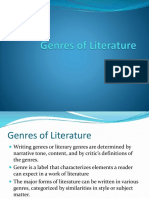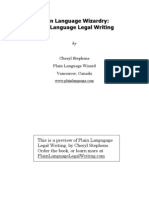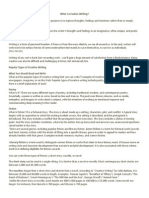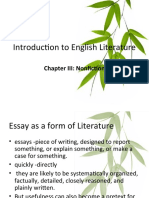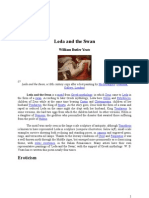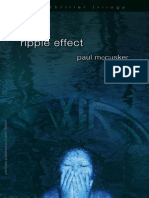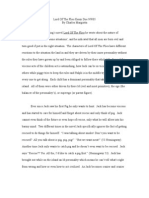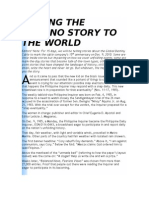EWC 4U ISU Possible Topic Choices: Kiddy Lit
EWC 4U ISU Possible Topic Choices: Kiddy Lit
Uploaded by
richardmcloudCopyright:
Available Formats
EWC 4U ISU Possible Topic Choices: Kiddy Lit
EWC 4U ISU Possible Topic Choices: Kiddy Lit
Uploaded by
richardmcloudOriginal Title
Copyright
Available Formats
Share this document
Did you find this document useful?
Is this content inappropriate?
Copyright:
Available Formats
EWC 4U ISU Possible Topic Choices: Kiddy Lit
EWC 4U ISU Possible Topic Choices: Kiddy Lit
Uploaded by
richardmcloudCopyright:
Available Formats
EWC 4U ISU Possible Topic Choices
1. Kiddy Lit: i) Write and illustrate a series of three or four children*s books based on the same characters or theme. You should use an archetypal pattern and follow the conventions of children*s literature. Submit your work in polished book form with all the illustrations in place. Include an annotated bibliography of all the children*s stories and critical sources that you read as part of your research. References might include: Eileen Roberts The Children*s Picture Book: How to Write It. How to Sell It or Lee Wyndham*s Writing for Children & Teenagers. ii) Choose your own adventure. Research the stylistic techniques of early-teen chooseyour- own-adventure storytelling, and construct a story in this style (e.g. Edward Packards Sugarcane Island, or Doug Termans By Balloon to the Sahara). 2. Script: i) Write an original film script. As with the short story, above, the scope of your work should be sufficient to justify the amount of time allotted to the preparation. Provide a brief commentary outlining the conventions of your chosen genre, and briefly explain how your script conforms to the conventions of that genre. You must also provide storyboards for at least one scene of your script. For top marks, this film should be produced in its entirety for the ISU presentation. ii) Write a one-act play suitable for videotape or live presentation. Your creative writing should show mastery of the art of scripting (see, for example, J.M. Stranczynski*s The Complete Book of Script Writing, R. Hull*s How to Write a Play and A. Brenner*s The T.V. Scriptwriter*s Handbook) as well as character development, plotting, suspense & foreshadowing, etc. Some storyboarding & a script should be included in your final product. iii) Research the form and techniques of the radio play by reading at least one how to book, such as R.L. Hillard*s Writing for TV and Radio and listening to many contemporary examples on tape or on the CBC. Write a radio-play script and record it, using appropriate sound effects, etc. that you have learned from your research. 3. Poetry: Prepare a collection of original poems around a central theme or image. Your poems must explore a variety of styles and techniques (sonnet, free verse, etc.) and you may wish to illustrate your work with paintings, pictures, or artifacts.
4. Magazine: Prepare a series of 8-10 magazine articles on a topic which you would like to explore. Include original photographs, interviews, insider*s reports, advertisements, etc., and present it in professional-looking format. Use your articles as a basis (only!) for presenting your topic to the class. When youre done, it MUST look like a magazine.
5.
Impressionistic Writing: The impressionist style of fiction writing often centers around the mental life of the characters, by observing his impressions or sensations instead of interpreting experience. Impressionistic poetry often implies a response to an event or subject rather than describing the actual feelings evoked. This allows the reader to form their own ideas as to what the writer is trying to convey, as opposed to the writer telling outright how they see and feel about a subject. In particular Stream of Consciousness is a good example of impressionistic writing. (Look for works by such writers as Katherine Mansfield, Katherine Anne Porter, James Joyce, Judith Guest, Virginia Woolf or William Faulkner.) Fictionalized Family Tree: Prepare an historical portrait of one branch of your own family which combines fact with fancy trace its origins and colourful characters and write a series of brief narratives using family members as key figures in notable occurrences in your family*s history. If your family happened to be involved in significant historical events as well, so much the better. Your work should evoke a sense of the time and place in History, but should also demonstrate your knowledge of creative writing characterization, dialogue, plot, etc. Please note, this topic is not intended to be merely a dry-as-bones family tree. For example, if your family is Irish, there need to be Leprechauns! Myths or Fables: Write & illustrate four myths, fables or fairy stories which conform to the conventions of the genre you select. Base your writing on what you learn by studying classic models in at least one collection, and by reading literary criticism on your topic (e.g. Joseph Campbell*s The Hero with a Thousand Faces or J.R.R. Tolkien*s On Fairy Tales in The Tolkien Reader). Prepare a chart to summarize the typical conventions of your chosen genre. Your oral presentation should explain your genre and its conventions, and you should present one of your pieces and explain how it conforms to the conventions. Epistolary writing: i) Write a story that consists entirely of letter correspondence in the style of an epistolary novel. Good examples of this are Brain Stoker*s Dracula or Nick Bantock*s Griffin & Sabine. Present your story in a creative fashion to the class. ii) Write a story that unfolds as part of electronic communication emails, text messages, twitters, blogs, e-diary entries, etc. The narrative should unfold as a gestalt of the collected information presented in the electronic sources. (Be careful, this is a difficult one to do well!) The presentation must include an A/V expression of the electronic communication.
7.
8.
9.
10. Cultural Narrative: Read two books (fictional, historical, biographical, etc.) which portray life in a different culture (e.g. Memoirs of a Geisha, Shogun, Life of Pi, Cry the Beloved Country, A Town Like Alice, etc.). Write a short story or one act play set in your country of your choice, which clearly reflects your understanding of the cultural, social, political or economic situation that country. In your presentation, explain how your creative writing mirrors the books you read, making specific reference to the sources and your own work. Your culture could be present or past (but also see #14, below: Historical Fiction).
11. Travel Writing: Research someplace outside of North America (with a different culture and markedly different geography or climate, etc.) and write a short story or narrative set in that place (e.g. Bill Brysons In a Sunburned Country or African Diary or Edward Abbeys Abbeys Road or Robert Young Peltons The Worlds Most Dangerous Places). Your protagonist could be either a resident of that distant place, or a traveller journeying through it. The main goal of this topic is to develop character and a sense of place. 12. Historical Fiction: Research a period in history that interests you. Script a one-act play that follows the conventions appropriate for the period in which the play is set. For example, if you study ancient Greece or Rome, your play must be written in the style of Greek or Roman Comedy, Romance, or Tragedy; if you study the early-mid 20th century, your play might be written in the style of the Theater of the Absurd. (A valuable resource book is D. Brockett The Theatre.) 13. Montage: i) Prepare a Photo Montage centred on a particular topic or theme, with your narrative woven into and interdependent upon the images used. Present your montage in a creative fashion. Please note! The photos included in your montage MUST be predominantly your own original product not magazine or internet pictures etc. (Although you may Photoshop your characters into images taken from the internet, thereby creating an original piece of work ask Breaton for clarity before you proceed with this.) Your writing may take the form of poetry, short story, social commentary, etc., but evaluation will consider the elements of creative writing that you*ve brought to bear imagery, theme, continuity, plot, characterization (if applicable) etc. ii) Prepare a Video Montage centred on a particular topic or theme, with your narrative woven into and interdependent upon the images uses. Present your Video Montage in a creative fashion. As with the Photo Montage, the video needs to be predominantly your own work, although you may salt in videos taken from other sources, edited so as to contribute to your storyline. Your writing may take the form of poetry, short story, social commentary, etc., but evaluation will consider the elements of creative writing that you*ve brought to bear imagery, theme, continuity, plot, characterization (if applicable) etc. 14. Science-Fiction (Sci-fi): Study Science Fiction as a form of literature by reading two classic (suggested authors: H.G. Wells, Isaac Asimov, Robert Heinlein, Spider Robinson, Poul Anderson, Roger Zelazny) and two contemporary (e.g. David Weber, Robert J. Sawyer, Neil Gaiman, Harry Turtledove, William Gibson) SF books. Write a SF short story which conforms to the conventions of the form. Submit it along with a 200 word critical commentary on each of the primary sources you read. Provide a brief commentary outlining the conventions of your chosen genre, and briefly explain how your story conforms to the conventions.
15. Horror: Study Horror as a form of literature by reading two classic (suggested authors: e.g. Bram Stoker, Mary Shelley, H.P. Lovecraft, Edgar Allen Poe) and two contemporary (e.g. Stephen King, Anne Rice, Dean Koontz, Manly Wade Wellman, Tanith Lee) Horror books. Write a short story which conforms to the conventions of the form. Submit it along with a 200 word critical commentary on each of the primary sources you read. Provide a brief commentary outlining the conventions of your chosen genre, and briefly explain how your story conforms to the conventions. 16. Other Specialized Genre: Study another genre of your choice as literature and follow the same steps shown in 14 and 15, above. The scope of your work should be sufficient to justify the amount of time allotted to the preparation. Submit it along with a 200 word critical commentary on each of the primary sources you read. Provide a brief commentary outlining the conventions of your chosen genre, and briefly explain how your story conforms to the conventions. 17. Songs: Compose lyrics and music for at least four original songs, in any musical style. For this assignment, you must submit not only the lyrics, but also your original musical notations. (And no, you cant just chord your way through it...) In addition, include research notes and a 500 word explanation of the conventions and history of your musical genre, with justification as to how your songs conform to the conventions and traditions of the genre. 18. Dealer*s Choice: If none of the above options appeal to you, you are free to propose one of your own. Write a half to full-page proposal of your topic and submit it for approval within one week.
You might also like
- Crossover Discussion GuideDocument3 pagesCrossover Discussion GuideHoughton Mifflin Harcourt100% (6)
- Important Characters in Hard TimesDocument8 pagesImportant Characters in Hard TimesJoshua0% (1)
- Satire and Crit EssayDocument74 pagesSatire and Crit Essaytrances scriptNo ratings yet
- Amy S. Watkin-Bloom's How To Write About Charles Dickens (Bloom's How To Write About Literature) - Chelsea House Publications (2008)Document257 pagesAmy S. Watkin-Bloom's How To Write About Charles Dickens (Bloom's How To Write About Literature) - Chelsea House Publications (2008)Cristina Mandoiu100% (1)
- Great Writers on the Art of Fiction: From Mark Twain to Joyce Carol OatesFrom EverandGreat Writers on the Art of Fiction: From Mark Twain to Joyce Carol OatesNo ratings yet
- The Famous Book of Tafseer-E-Quran - Tafseer Ibn-E-Kaseer in Urdu para # 9Document107 pagesThe Famous Book of Tafseer-E-Quran - Tafseer Ibn-E-Kaseer in Urdu para # 9Pakistan Digital LibraryNo ratings yet
- Entrepreneurship UkDocument32 pagesEntrepreneurship UkposnirohaNo ratings yet
- Plain Language Legal Writing-Cheryl-StephensDocument11 pagesPlain Language Legal Writing-Cheryl-StephensMitchell Davis100% (3)
- Literary Genre: Learning Module in 2 1 Century Literature Grade 12 Stem First Quarter, Week 2 Module No.2Document14 pagesLiterary Genre: Learning Module in 2 1 Century Literature Grade 12 Stem First Quarter, Week 2 Module No.2Acilla Mae BongoNo ratings yet
- 21 Century Literature From The Philippines and The World: II.: Concept Notes With Formative ActivitiesDocument19 pages21 Century Literature From The Philippines and The World: II.: Concept Notes With Formative ActivitiesRomalyn Joy Baldo Viernes100% (2)
- 21st Century Literary GenresDocument72 pages21st Century Literary GenresRichel Kaitlin TapiaNo ratings yet
- Alternative Genre Paper AssignmentDocument2 pagesAlternative Genre Paper AssignmentZainab YounusNo ratings yet
- Catcher in The Rye ProjectsDocument2 pagesCatcher in The Rye ProjectsErvin CabangalNo ratings yet
- Creative NonfictionDocument5 pagesCreative NonfictionCacai Monteron Peralta100% (1)
- 21st Century Q3 Week 5Document74 pages21st Century Q3 Week 5Philiprie CachoNo ratings yet
- 21st WEEK 3 GENRES 1Document36 pages21st WEEK 3 GENRES 1nickzapanta45No ratings yet
- CNFW Lesson 1Document4 pagesCNFW Lesson 1Wayne Dolorico MillamenaNo ratings yet
- 3RD Week in Socsci 101Document7 pages3RD Week in Socsci 101Marlon AndayaNo ratings yet
- 21st Century Literary Genres, Elements, and StructuresDocument20 pages21st Century Literary Genres, Elements, and StructuresJrick Escobar100% (2)
- Reviewer in 21ST Century Literature (Creative Non-Fiction)Document7 pagesReviewer in 21ST Century Literature (Creative Non-Fiction)Jaillah AblañaNo ratings yet
- Litb1 Aspects of NarrativeDocument19 pagesLitb1 Aspects of Narrativeapi-28708925No ratings yet
- 21st Century Literature Week 3 Day 3Document32 pages21st Century Literature Week 3 Day 3KATHERINE JOY ZARANo ratings yet
- Literary GenresDocument53 pagesLiterary Genresmhel santillanNo ratings yet
- 21st Century Literature GenreDocument29 pages21st Century Literature GenreCypher Linx100% (1)
- Tasks 1Document2 pagesTasks 1ВячеславNo ratings yet
- Eng 12 Ap SG Questions How To Read Literature Like A ProfessorDocument8 pagesEng 12 Ap SG Questions How To Read Literature Like A Professorapi-256802251No ratings yet
- M15-Art-AppreciationDocument10 pagesM15-Art-AppreciationFamily AccountNo ratings yet
- What Is Creative Writing?: What You Should Read and WriteDocument4 pagesWhat Is Creative Writing?: What You Should Read and WriteCarla Naural-citeb100% (1)
- Fairy Tale ExtensionDocument2 pagesFairy Tale Extensionapi-260992897No ratings yet
- Q1Module2 21stCenturyLiteratureFromThePhilippinesToTheWorld 2021 2022Document18 pagesQ1Module2 21stCenturyLiteratureFromThePhilippinesToTheWorld 2021 2022Mark Anthony GarciaNo ratings yet
- 21st Century Lit Q1 Module2 EditedDocument11 pages21st Century Lit Q1 Module2 EditedKhleaNo ratings yet
- Writing A Literary Paper: "Side Shows For Maisie"Document13 pagesWriting A Literary Paper: "Side Shows For Maisie"Allaiza Mhel Arcenal EusebioNo ratings yet
- Q1 Module 3Document4 pagesQ1 Module 3Clare SiplonNo ratings yet
- A Guide To Writing The Literary Analysis EssayDocument9 pagesA Guide To Writing The Literary Analysis Essayapi-249002674No ratings yet
- 21st Lit Cent. ReviewerDocument3 pages21st Lit Cent. ReviewerasquarerabbitNo ratings yet
- Teaching-Guide - 3Document7 pagesTeaching-Guide - 3maepaule06No ratings yet
- Conventional AND 21St Century GenresDocument34 pagesConventional AND 21St Century GenresMyrna NicolasNo ratings yet
- Q2 MODULE 5 at 21st CENTURY LITERATUREDocument52 pagesQ2 MODULE 5 at 21st CENTURY LITERATUREKENNEDY VAGAYNo ratings yet
- 3rd QTR. REVIEWER 21ST CENTURY LITDocument6 pages3rd QTR. REVIEWER 21ST CENTURY LITBienvenido III MendozaNo ratings yet
- Animal Farm Essay Questions 2024Document5 pagesAnimal Farm Essay Questions 2024lenzi.ikkiNo ratings yet
- 21 Century Literature From The Philippines and The WorldDocument37 pages21 Century Literature From The Philippines and The WorldMrGoNo ratings yet
- 21ST CenturyDocument7 pages21ST CenturyJohn Russel AlvarezNo ratings yet
- American Poet Research Project: The ObjectivesDocument2 pagesAmerican Poet Research Project: The ObjectivesPam ChildressNo ratings yet
- Term Paper-1Document50 pagesTerm Paper-1selvakarthi3000No ratings yet
- Creative Writing Module 5 and 6Document3 pagesCreative Writing Module 5 and 6Michael Anthony Enaje88% (8)
- Learning Activity Sheet: I. ObjectiveDocument5 pagesLearning Activity Sheet: I. ObjectiveLarisha Frixie M. DanlagNo ratings yet
- 21st Century Literary GenreDocument21 pages21st Century Literary GenreRense Jun PunsalanNo ratings yet
- 21st Century Literature GuideDocument2 pages21st Century Literature GuideivyfairiesNo ratings yet
- 21st Century Literature - Lesson 2Document3 pages21st Century Literature - Lesson 2mrsclmdccntNo ratings yet
- Literary GenresDocument2 pagesLiterary GenresElla Katarina LaguertaNo ratings yet
- Introduction To English Literature: Chapter III: NonfictionDocument34 pagesIntroduction To English Literature: Chapter III: NonfictionAomme JogthongNo ratings yet
- 21ST Century Las 4 Q4Document4 pages21ST Century Las 4 Q4Shalene Dale Panague CamayudoNo ratings yet
- Week 1 (21st)Document61 pagesWeek 1 (21st)angelobobadilla0412No ratings yet
- Literary Analysis Essay: Academic CommunicationDocument39 pagesLiterary Analysis Essay: Academic CommunicationFrancis Raagas100% (1)
- 13 21st GenreDocument54 pages13 21st GenreMa. Juliana MabanesNo ratings yet
- Week 3.1Document3 pagesWeek 3.1Yhel LantionNo ratings yet
- Text SetDocument43 pagesText SetPia CabaluNo ratings yet
- Creative Non FictionDocument11 pagesCreative Non FictionJessa Landero Bahandi100% (1)
- Russian Formalism? How Are They The Same? CompareDocument14 pagesRussian Formalism? How Are They The Same? CompareNica MangampatNo ratings yet
- Dreaming the Graphic Novel: The Novelization of ComicsFrom EverandDreaming the Graphic Novel: The Novelization of ComicsRating: 4.5 out of 5 stars4.5/5 (1)
- Ruth Hannah Learning To Walk by Faith PDFDocument34 pagesRuth Hannah Learning To Walk by Faith PDFMelissa Wong Ling LeeNo ratings yet
- Newsfiles SCE Suppl 1 2Document43 pagesNewsfiles SCE Suppl 1 2XavierNo ratings yet
- Bloomsbury Publishing Proposal Form2019Document4 pagesBloomsbury Publishing Proposal Form2019Marium BhalaNo ratings yet
- The Canterbury Tales MatchingDocument5 pagesThe Canterbury Tales Matchingkcafaro59No ratings yet
- W.B.yeats Leda and The Swan 2Document5 pagesW.B.yeats Leda and The Swan 2Daineanu Madalina Delia100% (1)
- Expert B2 - Stop and Check 1 - Units 1 To 4Document3 pagesExpert B2 - Stop and Check 1 - Units 1 To 4Eron JuniorNo ratings yet
- Eros AtaliaDocument2 pagesEros AtaliaDianne Bayawa AguirreNo ratings yet
- Colour by NumberDocument4 pagesColour by NumberIrena Agatha SimanjuntakNo ratings yet
- Stream of Consciousness Definition WOOLFDocument3 pagesStream of Consciousness Definition WOOLFConny DorobantuNo ratings yet
- The Sum of Their PartsDocument266 pagesThe Sum of Their PartsMohak VermaNo ratings yet
- Skills For The TOEIC Test SpeakingDocument102 pagesSkills For The TOEIC Test SpeakingHà My NguyễnNo ratings yet
- Guidebook 184Document1 pageGuidebook 184Anonymous 7GOnu0xeuCNo ratings yet
- Time Implosion V0-11a WalkthroughDocument5 pagesTime Implosion V0-11a WalkthroughBaronNo ratings yet
- English Common CourseDocument7 pagesEnglish Common CourseBeenu BennyNo ratings yet
- Stella Octangula NumberDocument2 pagesStella Octangula NumberВук Дражић100% (1)
- Pre-Ple Eng 2023Document8 pagesPre-Ple Eng 2023Godfrey TuryakiraNo ratings yet
- Kwezuonu A Beginners Guide To The Igbo Language 1950279049 9781950279043 CompressDocument170 pagesKwezuonu A Beginners Guide To The Igbo Language 1950279049 9781950279043 CompressFaiza KamilaNo ratings yet
- Ripple Effect by Paul McCusker, Chapter 1Document8 pagesRipple Effect by Paul McCusker, Chapter 1ZondervanNo ratings yet
- Cat520 2Document84 pagesCat520 2trungtinh1506100% (1)
- Amba Edisi Revisi Indonesian Edition by Laksmi Pamuntjak Download Ebook Amba Edisi Revisi Indonesian Edition by Laksmi Pamuntjak PDF CompressDocument6 pagesAmba Edisi Revisi Indonesian Edition by Laksmi Pamuntjak Download Ebook Amba Edisi Revisi Indonesian Edition by Laksmi Pamuntjak PDF CompressRana MahiraNo ratings yet
- Deception of AmillennialismDocument8 pagesDeception of AmillennialismMatthew Strom0% (1)
- 7mm MauserDocument16 pages7mm MauserJohn Anderson100% (3)
- Lord of The Flies EssayDocument3 pagesLord of The Flies Essaymargiottac0967% (3)
- Sylvia PlathDocument2 pagesSylvia PlathEnding SuryaniNo ratings yet
- Telling The Filipino Story To The WorldDocument37 pagesTelling The Filipino Story To The WorldLian Las PinasNo ratings yet


